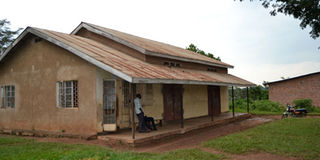Prime
Government asks BoU to explain Cooperative Bank closure

Defunct. A cooperative store in Luweero District currently houses a nursery and primary school. Cooperative Bank, which supported cooperatives, was closed in 1999. PHOTO BY DAN WANDERA
What you need to know:
- The other defunct banks whose closures were audited are International Credit Bank Ltd (closed September 1998), Greenland Bank (closed April 1999) and Cooperative Bank, closed in May 1999.
- Cooperative Bank was formed in 1964. However, it lasted for 35 years before it was closed through unclear circumstances.
Kampala. The Ministry of Trade, Industry and Cooperatives has written to the authorities at Bank of Uganda to explain why they closed Cooperative Bank.
Mr Frederick Ngobi Gume, the State Minister for Cooperatives, on Wednesday said his colleague, Ms Amelia Kyambadde, has on three occasions written to BoU, demanding the details of the liquidation report but the bank is yet to comply.
Government wants to know the reasons for the closure of the bank to assist the Trade ministry and the shareholders understand what could have gone wrong. The government is in the process of reviving Cooperative Bank.
“Since last year, we have written three letters to Bank of Uganda requesting for a liquidation report for the defunct Cooperative Bank,” Mr Gume said.
The minister said BoU officials did not respond to the two letters and only replied recently with a promise to avail the report.
He also said President Museveni has given the ministry a go ahead to re-establish Cooperative Bank to provide agriculture and commodity financing to the cooperative movement.
Mr Gume said consultations were on-going and that co-operators have backed a proposal to partner with an investor with “cooperative interests”.
Sources close to Cabinet told this newspaper that when ministers took a decision to a revive Cooperative Bank last year, Ms Kyambadde was instructed to write to the Governor Emmanuel Tumusiime-Mutebile to explain why the bank was closed.
They also demanded the details of the liquidation report following complaints from cooperative members who wanted compensation and investigations into the bank’s closure.
Although BoU has not officially released the liquidation reports as the case with the disputed sale of Crane Bank, the latest forensic audit report by the Auditor General has also cited irregularities in the liquidation and selling off of five commercial banks by the Central Bank dating back to 1993.
The draft report, which also inquired into the sale of Cooperative Bank, shows that at least Shs23b from the sale of only Global Trust Bank (GTB) is unaccounted for, 25 land titles are missing, and customer loans inherited from closed banks were sold at an undervalued rate. GTB was closed in July 2014.
The other defunct banks whose closures were audited are International Credit Bank Ltd (closed September 1998), Greenland Bank (closed April 1999) and Cooperative Bank, closed in May 1999.
Regarding the three banks, auditors found out that they had assets worth Shs117b in cash, loans, property, equity investment, amounts due from related parties and balances from other banks at the time of closure.
The report, however, indicated that BoU refused to cooperate with the Auditor General regarding the sale of Crane Bank, National Bank of Commerce and Teefe Bank.
Speaker Rebecca Kadaga has since ordered BoU to comply with the Auditor General.
BoU speaks out
Mr Kelvin Kizito Kiyingi, one of the communications officials at BoU, said the bank is still in the process of finalising the liquidation process.
“However, there was a Judicial Commission of Enquiry into the three banks that failed in the 1990s. This commission was chaired by Justice James Ogoola; and, established comprehensively why these banks failed. The BoU cooperated fully with this enquiry and provided information to it.”
Although government is in the process of re-opening Cooperative Bank, Mr Kiyingi said: “A liquidated company cannot be re-opened. When co-operative bank was closed, it was insolvent, which means that its liabilities exceeded its assets.”
About cooperative bank
Cooperative Bank was formed in 1964. However, it lasted for 35 years before it was closed through unclear circumstances. Although BoU cited inadequate capitalisation and insolvency as reasons for closing the bank, the government, with support of 18,000 cooperatives and 8,000 Saccos is pushing for the bank’s revival.




